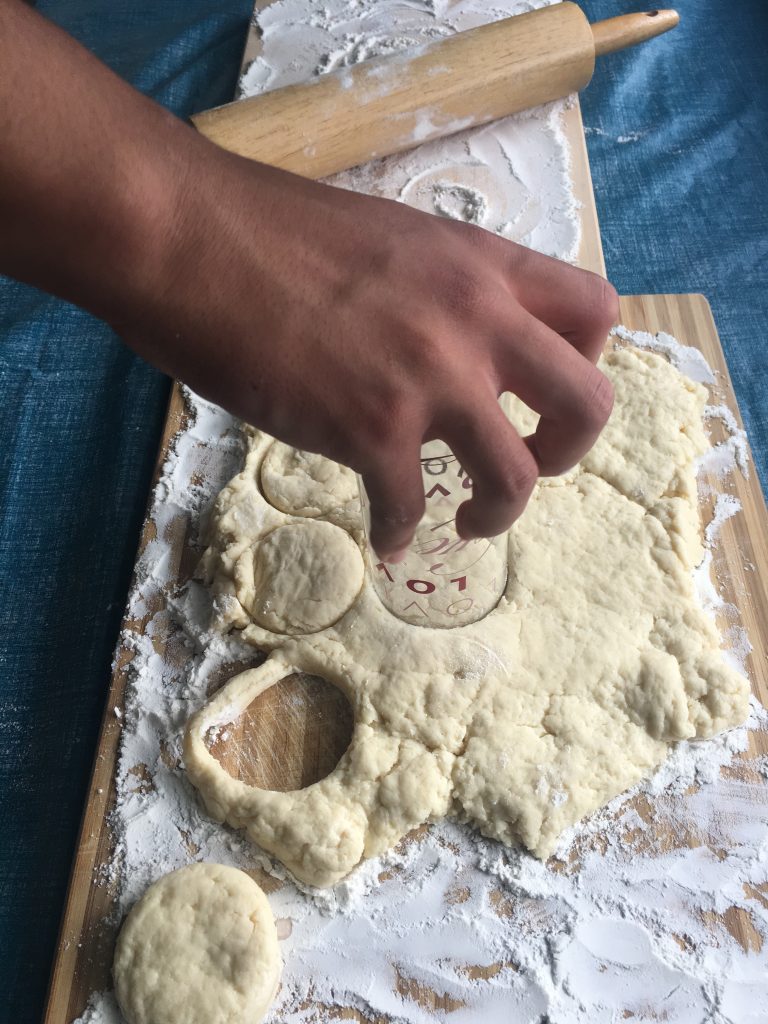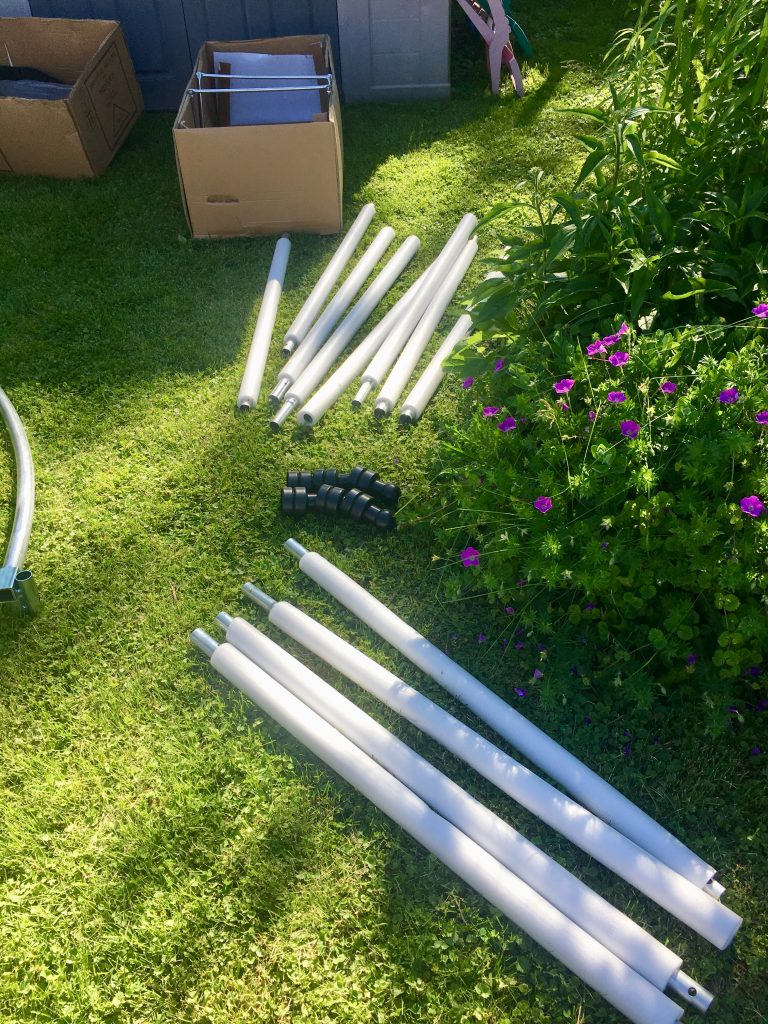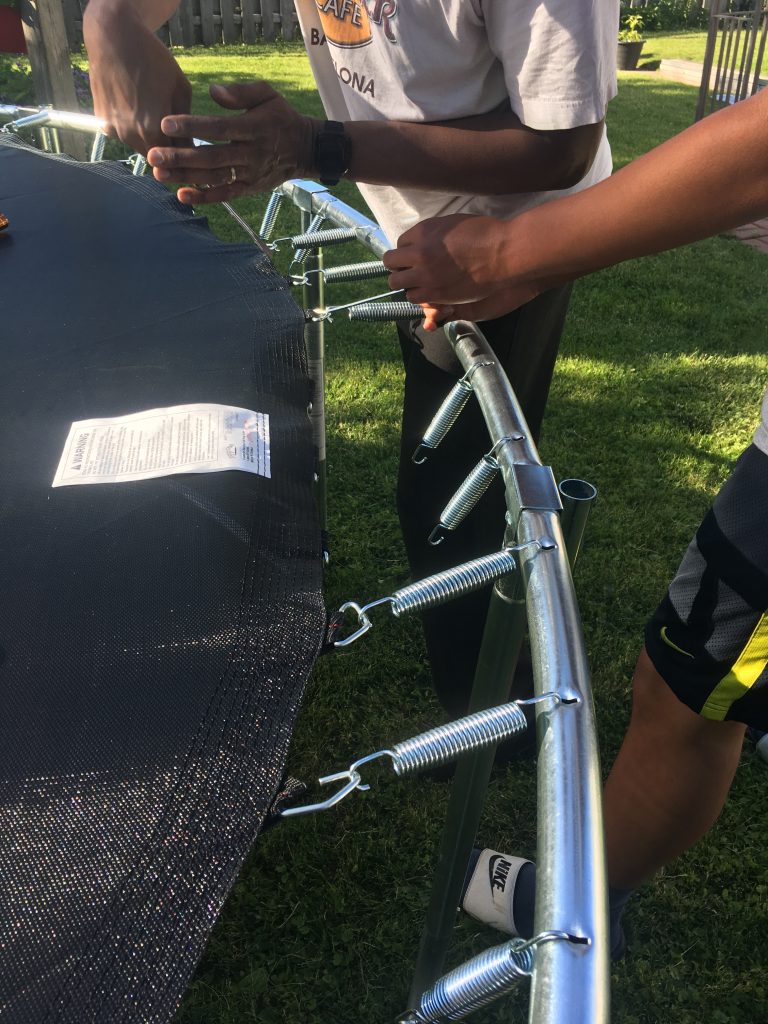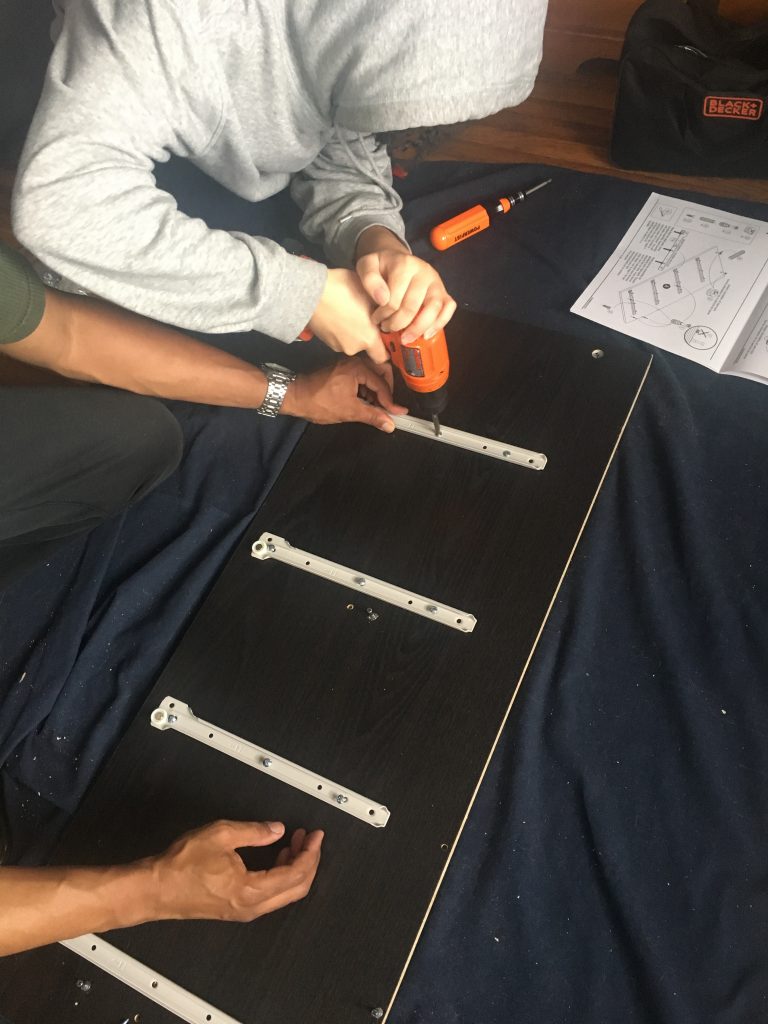My two younger kids were up early this morning cleaning up cat vomit. It’s a lovely way to start a story, I know😉. It’s relative to what I’ve been thinking about, though, so bear with me. It was a bit of a mess. I passed them in the kitchen as I was heading back to bed from getting a glass of water. They were getting paper towel and spray cleaner from the cupboard. I heard them chatting calmly (one a bit more so than another) about a few things … to pre-wet the paper towels or not, to clean the couch or floor first, whether to pick up my daughter’s throw blanket (which also lay victim) from the corner of the couch and just get it into the washing machine before starting anything else. Then they got to work.
None of this is particularly remarkable really. They are both teenagers. The clean up looked a bit gross, but not outrageous. It was early-ish, but not a middle of the night, “woken from a dead sleep to deal with a situation” kind of early and they were obviously awake anyway to have noticed it. It sounds like a lot written out, but really the conversation was 3-4 whispered sentences.
There is, however, a piece that is possibly a bit remarkable and that is the piece that goes against a lot of typical parenting advice – the kind that might have colour -coded chore charts and lists of tasks assigned to each person. Maybe there are even consequences attached if chores don’t get done. Maybe there is allowance attached to them or money available to be earned or maybe not. That piece is that we don’t have those things and never have.
I’m not saying people shouldn’t have these arrangements or that they don’t work for many families. Each home and combination of people is different. If you have chickens out back, it likely makes good sense for the chickens if there is some organized thought around who will be feeding them, and a list or calendar might help you do that. If you need to be out certain times of the week and have younger kids, it’s obviously good to have a clear sense of which older child is specifically taking responsibility. I’m just saying that if you’re not a person who is into lists on the fridge (however funky or pretty), chore charts on the wall, check-offs, and “have you finished your “this” before you do “that?” it might just be okay. It might even work really well.
Common parenting advice would suggest (and often vehemently) that kids need to be taught responsibility with clearly laid out expectations and consequences. It would recommend that, taking age and ability into consideration, tasks should be divided equally among siblings so that everyone is doing their fair share. Common thinking is that without solid rules and structured guidelines, homes will descend into chaos or maybe semi-chaos at least.
This sounds reasonable on many levels and systems might flow very smoothly for some people, but I am not a list maker or a chore chart creator or a warden (or even a “noticer” around who gets what done), and yet the energy in our home is not chaotic. For the most part, it’s peaceful, laid back and collaborative.
Why and how? I don’t know exactly but I think a lot of it has to do with rhythm, relationship and natural responsibility. I also feel like I could refer to the rhythm part as “flow,” but I’ve always been a sucker for alliteration, so I’m going to go with rhythm, relationship and natural responsibility😉.
Rhythm …
Rhythm in a home, like rhythm in music or nature, isn’t something that is as easily defined as it is felt or experienced. Sometimes examples are the simplest way to describe it.
My husband usually gives food and water to the cats in the morning. He was never assigned that task nor did he declare it his own. One of the cats would just connect to him specifically in the mornings and in walking together to the kitchen, he would naturally give it food and fresh water. It just became part of the rhythm of the morning. The other morning, he left really early and for whatever reason didn’t refresh the cats’ food and water (it doesn’t matter why – we’ll get to that in the relationship part). It wasn’t a big deal. He would have known we were home. The cats would make themselves known once they were hungry.
I didn’t notice but my daughter must have as she walked by. I saw her filling the bowls and water dish. No big deal. She just realized it hadn’t been done, didn’t want the cats to be hungry, so did it. A small piece of the regular rhythm was off, she felt it, did something small and things began to flow again.
I have always tended to be the grocery shopper in the house. When the kids were little, they would be with me and it was a group event. As they got older, I would either get groceries while out waiting for them to be finished an activity, grab them on my way home from work or head out on my own. The response when I arrive home is usually the same. Someone notices I’ve pulled in, and a sort of relay begins with someone getting the groceries out of the car, some taking to the kitchen and someone putting away. If one of the kids is with me, they help carry in. It is just a routine that is unspoken and flows. If it’s really cold out, sometimes, I text ahead to let them know I’m on my way home and ask if could they be ready. I don’t think it feels like an assignment or chore per se – it’s just a matter of reality. We all want food and it happens more efficiently and respectfully if we each pitch in. And if someone is occasionally in the midst of something else and doesn’t pitch in? Then they don’t, because, well, they’re occasionally in the midst of something. Life goes on.
I think the concern is that if there’s somehow not reinforcement or punishment involved for not helping, kids will never learn to do their share. If there aren’t rules around having to help from a young age, they will become lazy or selfish adults.
I haven’t found this to be true and I think it’s related to the next piece … relationship.

Relationship …
Relationships develop over time. They are kind of cyclical. When groups of people collaborate, they get to know each other well … each other’s strengths, weaknesses, things that make a person shine and things that are upsetting or hard for them. They develop relationship. Even in the face of frustrations and irritations (because those always exist in any group of people, and families are no exception), they usually want what’s best for each other and for the collective. By getting to know each other well and thereby beginning to take each other’s needs into consideration, they begin to collaborate even more strongly.
Working together leads to deeper relationship which can evolve into an even stronger, healthier common ground for working together.
It’s relationship that let my daughter know that it wouldn’t be necessary or productive to point out to my husband that the cats hadn’t been fed that early morning. Healthy relationship urged her to simply help out without comment when he’d possibly had a rushed morning. There was no need to take credit or keep score.
It’s relationship that has motivated me to often partner with the boys and their newspaper routes over the years. If I had a dollar for each time a well-meaning customer hollered out in the midst of snowy or icy day, however good-naturedly, “Whose paper route is this anyway? You don’t know how lucky you are to have a mother who will help you do your work!” And maybe that’s true. But they didn’t know how lucky I was to have those same boys who would help out with a task or something with their younger sister if I was late getting home from an evening work meeting. The last thing I’d find helpful in those situations would be to hear, “That’s your work, Mum. That’s your responsibility. You should have planned your time better. Maybe you’ll think it through better next time.”
No, that’s not how we choose to operate here. We aren’t always in a position to support one another in the moment, but when we can, we generally do. The mutually respectful relationships we’ve developed motivate us to work as a team.
Offering support and willingness to help fills our children’s buckets. When people have their needs met, they are much freer and able to give to others. When they don’t have to spend all their time watching their own back, so to speak, they have energy to give to others.
To clarify, there are a couple of things that I’m not talking about here.
I’m not talking about an extreme indulging of other family members and ignoring your own needs. I’m not talking about being afraid of asking your children or spouse to help out. I’m not talking about avoiding honest discussion about what’s helpful and/or necessary around the house.
I am talking about asking for help in the context of natural situations and being as willing as possible to reciprocate. Rather than random demands to prove they’ve done their share, I’m talking about daily life lived together.
I’m also not suggesting that everything will be done to your exact satisfaction. Some children are naturally a little more keen to pitch in than others. But guess what? So are some adults. Give it some time and space. There are periods of development in which children and teens are much more inwardly focused. During those times, they may not be jumping up to help. Some genuine conversation to really learn more about what they’re interested in and what’s important to them and to express your own possible needs for help with something will likely go further than quick, frustrated demands that they do their share.
*Something to note … children who are in a lot of structured activities, whether that be school, other commitments, or a combination of the two, may need almost every other moment to decompress, particularly if they’re introverted or a highly sensitive person. It requires a lot of energy and/or processing time for introverts to balance hours of external, social stimulation. That may not lead to jumping up to naturally help out as soon as they get home, or maybe even two hours later.
When I was a pre-teen, I can remember a couple of years when I would spend hours after getting off the bus, watching TV, eating and sometimes just walking around creating ideas in my own mind. I had an almost insatiable need to decompress. As a teen I would sometimes have a huge Sunday afternoon nap, coming downstairs for supper, but likely not having offered to help with getting the meal ready. Looking back, it seems so lazy! Fear not, though! I haven’t turned out to be an irresponsible, selfish adult. Now, at an age where I have both freedom and responsibility over my time, I have more things I’d like to get done than I have time for. Slowing down is actually the growing edge for me now…


Responsibility ….
When I say responsibility, I mean authentic, natural responsibility.
Imagine this for a moment. The weather looks questionable. A child rechecks the weather forecast. He realizes that if he can get the newspapers delivered a bit early, he can likely avoid rain. He also sees that the rain will likely come before many customers are either home or have checked for their papers, so that even though he might be able to keep them dry upon delivery, they are unlikely to remain that way. He sighs a bit, as he gets out the plastic coverings. It will take a long time to cover the 94 newspapers and sets of flyers he’s already put together, but he wants happy customers, doesn’t want hassle from the newspaper office and wants to do a good job. He sees that his mother is preparing to go out and can’t easily help, so he just goes about it. He knows solidly that she’d help if she could. There are days he might enlist the help of a sibling and other days that he doesn’t. He usually intuitively decides one way or another based on either his own schedule or how engaged or not siblings might be in something else.
If this sounds like a familiar decision-making process to you, it may be because it’s the way you make decisions. I think it’s how most adults make decisions about how much to do on their own or not. We gather information about the situation, ourselves and others and proceed from there. By constantly assigning tasks and attaching consequences and rewards to children, I wonder if we pass on an assumption that work and responsibility are to be avoided and that kids aren’t capable of being motivated toward or managing any.
Children and teens can and do want to work at things and hold responsibility, both individual and shared. They benefit from being respected, supported, listened to and in some cases, mentored. Healthy people want to be needed, challenged, productive and part of things.
Now, imagine this. A mother is in the basement, working on the computer. She hears a child making their way down the stairs with a laundry basket. The child asks if the mother would mind if she put her load of laundry in. She needs some specific clothes for the next couple of days. The mother replies that it’s absolutely fine. No one else is using the washing machine at that moment. The child clarifies that they know, but they just wanted to make sure the mother wasn’t about to make a work call while at the computer because the washer might be too loud and make it hard to hear the call.
If you look closely at this situation, you can see elements of the child taking all three pieces into account … rhythm, relationship and responsibility.
She noticed the rhythm of her week, took responsibility for a piece that she wanted/needed (having certain items clean for a particular day) and took relationship into consideration by respecting how her timing might affect another family member.
And all without a chore chart, money or treat!


I’ll be honest … our house might be a bit more organized if we had a linear system that was enforced. There are trade-offs to most things in life. People might get more actual compliance and satisfaction that their household needs are met from an imposed chore system with external consequences and rewards. But then again, they also might not! Not all children are equally motivated by externally imposed rewards and consequences.
There is imperfection here, but nothing resembling chaos and disrespect. I think we’ll just keep on this path. I’d rather work toward a healthy rhythm, relationship and support of authentic responsibility.
How about you? What is your experience? Does any of this resonate with you? Or not?

Like this post? Please share.


Erin, I love this. Rhythm, relationship and responsibility so beautifully put. I especially liked the bit about recognizing the periods of development, or contemplation, or decompression, whatever it might be for the individual, and how our children might seem to go a bit up and down in terms of helping out. Have definitely found this to be the case, and it’s not that they’re irresponsible and selfish 🙂 Know there are times I’m much more efficient at keeping on top of the housework and times I’m so not.
So grateful to have young people in the house who’ve never had chore charts, apart from the odd ones they’ve designed themselves and then got bored of pretty quickly, but somehow they just step up when I need them. And not just when I *need* them of course, but that’s when I’m even more grateful 🙂
Been thinking a lot about responsibility lately and feel so strongly it’s linked to freedom, if we don’t feel free, it’s much harder for us to be responsible because there’s always a part of us that’s trying to claw back our freedom, we just don’t have the resources for responsibility.
As always so much to ponder on, thanks, Erin 🙂
Thanks Hayley! It’s such a good point that there are times that parents are more efficient about keeping on top of things and times that we are not. There are just times that we are more energized than others! Maybe remembering that helps us to give our kids a bit of grace. Love the thoughts about the link between freedom and responsibility – yes. And it’s funny that you mention the chore charts that your kids have sometimes designed themselves. My daughter used to love to do that, but yes, boredom with the chart itself came early here too:). I found an interesting Brave Writer podcast the other day where Julie Bogart highlights some good food for thought around potential reasons that kids are sometimes not as motivated as we are to keep the house clean. https://podcasts.google.com/feed/aHR0cHM6Ly9mZWVkcy5jYXB0aXZhdGUuZm0vYnJhdmV3cml0ZXIv/episode/N2Q3MTQ4MDAtMzJmZi00OGIyLWJhZWQtMTllYTg2ZDVlMGNm?hl=en-CA&ved=2ahUKEwjKipamqv3sAhUoFVkFHbOLBq4QjrkEegQIDRAI&ep=6.
You know I love a good podcast 🙂 Always enjoy listening to Julie, and haven’t had a chance to check that episode out yet, thanks for that.
Hi Erin. I love your piece on Chores, Learning Respect and Such… ! Thanks for sharing your wise insight on this important topic.
Thank you:). Glad you enjoyed it!
Hi Erin. I like this way of framing it. This does sound a lot like what works at our house (most of the time?) but I’d never actually thought about it this way. The relationship aspect makes so much sense though, especially your example of helping with the newspaper route as just part of helping each other. Thank you for breaking it down like that🙂.
Thank you, Allie. It’s funny – it took me a while to define for myself why it felt right to help out with the paper routes because technically it was very much their responsibility, but I just started seeing that they would naturally pitch in when I could use some help as well and it all made sense. Plus it’s kind of fun to plough through together and get it done on a snowy or rainy day. There’s the hot chocolate that follows;).